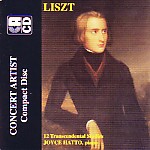[Editor’s Note: In the wake of the late-breaking scandal concerning the provenance of Joyce Hatto’s recordings, we had the option of removing all Hatto reviews, or leaving them intact and identifying the correct artists, to the extent possible, as we learn them. We have elected the latter, both as a caution and as a way to do some justice to the real artists as we learn their identities. This disc consists, for the most part (ten of twelve tracks), of Laszlo Simon’s performance of the Etudes on BIS, with one track taken from Minoru Nogima’s Liszt recital on Reference Recordings. DH]
Joyce Hatto’s recordings of Liszt’s Transcendental Etudes date from two single sessions spaced apart by a decade (December 28, 1990 and January 6, 2001, to be exact). Whatever the math, there is no doubt in my mind that hers is this cycle’s most technically accomplished, stylistically perceptive, and musically satisfying traversal on disc since Claudio Arrau’s. It has all the surface bravura Freddy Kempf musters up, but with infinitely more culture and brainpower behind the proverbial wheel.
In the opening Preludio, Arrau warms up his rhetorical engines as well as his fingers, whereas Hatto’s paragraphic sweep and unusually emphasized bass lines reveal that she has long since warmed up! The A minor’s rapid alternating chords fly from Hatto’s fingers without the slightest splinter or bang. Following a fluent, effortlessly multi-textured Paysage comes an amazingly light-fingered Mazeppa, where the middle-register double notes and outer melodic leaps emerge in strain-free perspective. Rarely has this piece sounded less clattery and notey. Hatto’s quicksilver, ultra-supple Feux Follets easily matches Richter, Nojima, and Kissin for double note proficiency and poetry (her choices about when and when not to pedal are worth a dozen expensive piano lessons).
You could argue that the F minor etude’s cascading triplets go too fast for comfort, but they never race out of Hatto’s control. She also protects Chasse-neige’s tremolos against aural fatigue by shading them in alluring tints and hues. Needless to say, Hatto’s highly distinct conceptions stand their ground alongside Cziffra’s gaunt, demonic recreations and Arrau’s heroic breadth and huge dynamic range, not to mention Lazar Berman’s bearish marksmanship and stamina.
The otherwise excellent sound is slightly bass shy with a touch of flintiness in the higher registers–but a closer, warmer, more detailed pickup is apparent in Vision (No. 6). Ates Orga’s erudite, scholarly annotations will appeal to Liszt aficionados as much as Hatto’s utterly natural, communicative command of these daunting pieces. Warmly recommended. [7/25/2006]
































